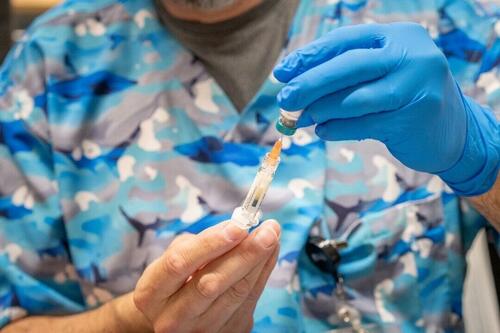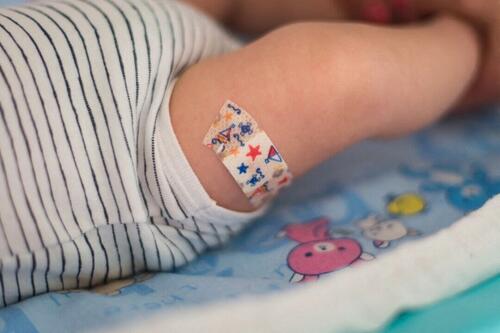
Советники CDC рекомендуют против MMRV Комбо-вакцина для маленьких детей Голосование за Hep B Shot
Автор Zachary Stieber via Эпохальные времена,
Центры по контролю и профилактике заболеваний должны прекратить рекомендовать конкретную комбинацию прививки от кори маленьким детям, сообщил 18 сентября Консультативный комитет по практике иммунизации (ACIP).

CDC должен рекомендовать только вакцину против кори, эпидемического паротита, краснухи (MMR), а не вакцину против кори, эпидемического паротита, краснухи, варицеллы (MMRV).Это также предотвращает ветрянку у детей в возрасте до 4 лет, сообщает ACIP.
Голосование было 8 против 3. Доктор Роберт Мэлоун отказался, потому что в прошлом он был платным экспертом для истцов, подавших в суд на Merck, которая производит вакцины MMR и MMRV.
Если Джим О'Нил, заместитель министра здравоохранения и исполняющий обязанности директора CDC, примет рекомендацию, CDC изменит свой график вакцинации.
В настоящее время CDC рекомендует либо вакцину MMRV, либо вакцину MMR вместе с отдельной вакциной против ветряной оспы для первой дозы против кори. В нем говорится, что вакцина MMR является предпочтительным вариантом для детей в возрасте от 12 до 47 месяцев, поскольку вакцина MMRV "связана с более высоким риском лихорадки и лихорадочных судорог. "
Около 85 процентов детей получают вакцины MMR и ветряной оспы, по сравнению с 15 процентами, которые получают вакцину MMRV, для первой дозы.
После вакцинации MMR на 3000-4000 привитых приходится примерно один дополнительный фебрильный припадок по сравнению с непривитыми детьми. Вакцинация MMRV увеличивает этот риск в два раза среди маленьких детей, сказал в презентации доктор Джон Су, чиновник по иммунизации CDC. Нет никаких доказательств повышенного риска после двух доз вакцины MMRV среди детей в возрасте от 4 до 6 лет.
Вторая доза вакцины против кори рекомендуется в расписании CDC для детей в возрасте от 4 до 6 лет.
GlaxoSmithKline и Merck производят вакцины MMR, очищенные в Соединенных Штатах, но Merck также делает единственную доступную вакцину MMRV. Компании не ответили на запросы о комментариях по времени публикации.
«Любое политическое решение, которое ставит под угрозу ясность или последовательность руководства по вакцинации для MMRV, может еще больше снизить доверие общественности», — сказал представитель Merck перед голосованием, ссылаясь на снижение уровня вакцинации среди детсадовцев.
Ретеф Леви, один из членов ACIP, который голосовал за изменение, сказал, что, по его мнению, это приведет к увеличению вакцинации, потому что будет меньше побочных эффектов. Доктор Коди Мейснер, который голосовал против изменений, сказал, что он хочет, чтобы родители выбирали между MMR и MMRV, потому что некоторые хотят, чтобы их дети получали меньше инъекций.
Группа должна была проголосовать за изменение рекомендаций по вакцинации против гепатита В, но перенесла голосование на 19 сентября, когда советники также будут голосовать за обновленные рекомендации по вакцине против COVID-19.

Кроме того, советники проголосовали за отсрочку голосования по поводу задержки первой дозы вакцины против гепатита В, которая в настоящее время рекомендуется для новорожденных в течение нескольких часов после рождения.
Консультативный комитет по практике иммунизации (ACIP) Депутаты 11-1 голосуют за предложение Это бы посоветовало CDC рекомендовать отложить первую дозу до минимального возраста 1 месяца.
Некоторые члены заявили, что они выступают за то, чтобы внести предложение из-за опасений, что CDC искажает безопасность вакцины против гепатита В.
В своем выступлении в четверг Адам Лангер из CDC сказал, что Институт медицины (IOM), теперь известный как Национальная академия медицины, обнаружил, что вакцина против гепатита В является «безопасной и эффективной», ссылаясь на доклад института 2002 года.
Вики Пебсворт, член ACIP, выступила против характеристики CDC, указав в четверг, что в своем последнем докладе, в 2012 году, институт заявил, что обзор имеющихся доказательств привел к невозможности отвергнуть или принять, что вакцина вызывает различные состояния, включая энцефалит или воспаление мозга.
«МОМ не пришла к выводу, что гепатит В безопасен, как было сказано здесь», — сказала она.
Д-р Роберт Мэлоун, другой член, который выдвинул предложение о табллинге, сказал в пятницу, что он пересмотрел утверждения в одночасье и встал на сторону Пебсворта.
Интерпретация того, что отсутствие данных подразумевает безопасность, я думаю, извращение. Он заявил.
Другие члены указали, что они проголосовали за отсрочку голосования, потому что они чувствовали отсутствие данных, подтверждающих перенос дозы при рождении.
Ни одна вакцина не является на 100% безопасной, и ни одна вакцина не является на 100% эффективной. Доктор Коди Мейснер, другой член ACIP, заявил. «Что важно для поставщика перед введением вакцины, так это подумать об этом конкретном пациенте, и действительно ли польза превышает любой возможный побочный эффект от вакцины. И когда вы применяете это к вакцине против гепатита В для новорожденных, я не думаю, что есть какой-либо вопрос, что польза намного перевешивает любые неблагоприятные побочные эффекты. "
Департамент здравоохранения и социальных служб не сразу ответил на запрос о комментариях.
Большинство европейских стран не рекомендуют вакцинацию против гепатита В при рождении, если у матери нет гепатита В. Некоторые не рекомендуют его вообще для детей.
«До сих пор вакцина против гепатита В была слишком дорогостоящей, чтобы оправдать ее включение в программу из-за очень низкого числа случаев», - сказал представитель Финского института здравоохранения и социального обеспечения, который не рекомендует вакцинацию против гепатита В для большинства детей.
Министр здравоохранения Роберт Кеннеди, который курирует CDC, поддержал перенос дозы при рождении, доктор Дебра Хоури, бывший высокопоставленный чиновник CDC, дала показания ранее на этой неделе. Стюарт Бернс, советник Кеннеди, «сказал мне, что секретарь предложил возраст 4 года», сказала она, добавив, что другой чиновник здравоохранения сказал ей, что секретарь хочет, чтобы доза при рождении была перемещена.
Хиллари Блэкберн, еще один член ACIP, была среди тех, кто задавался вопросом, как было решено, как минимум, 1-месячный возраст, по сравнению с 2-месячным возрастом, когда первая доза рекомендуется в некоторых других странах.
Мартин Куллдорф, председатель ACIP, сказал, что он участвовал в дискуссиях с должностными лицами CDC по этому вопросу.
«Я думаю, что это связано с тем, что вторая доза рекомендуется в США между одним и двумя месяцами», — сказал Куллдорф.
Несколько компаний делают гепатит Вакцины B доступны в Соединенных Штатах, включая Merck и Sanofi.
«Пересмотр вакцинации новорожденного против гепатита В по установленному графику представляет серьезную опасность для здоровья детей и общественности, что может привести к возрождению предотвратимых инфекционных заболеваний», — сказал представитель Merck.
Представитель Санофи заявил, что "доза при рождении гепатита В и вакцинация на ранних этапах жизни остаются наиболее эффективным вариантом профилактики гепатитных инфекций у младенцев и детей. "
Тайлер Дерден
Фри, 09/19/2025 - 13:05
